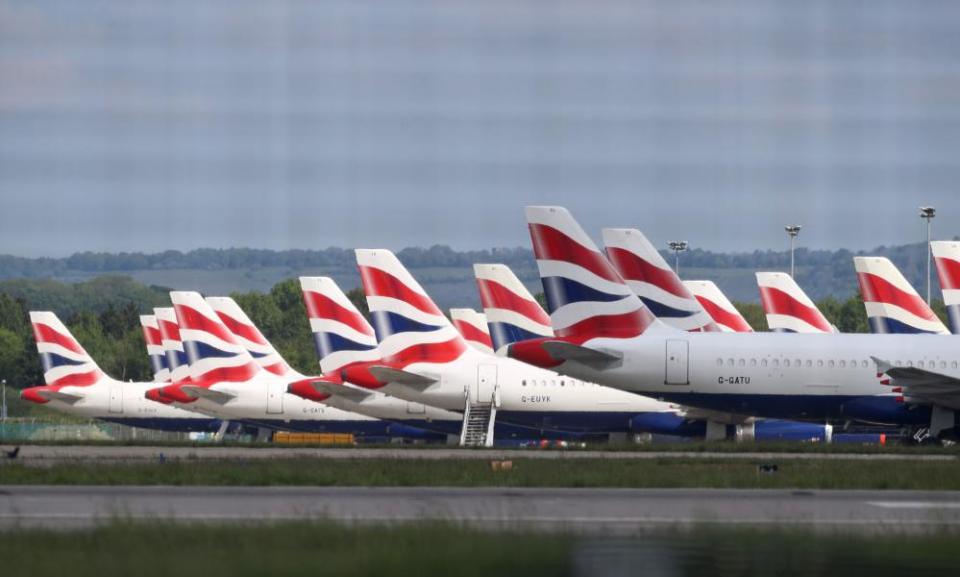Airlines and carmakers benefit from UK Covid relief scheme

Airlines, carmakers and oilfield engineers have benefited by billions from the government’s economic rescue plans, despite ministers’ assurances on a green recovery from the coronavirus crisis.
British Airways, EasyJet, Wizz Air and Ryanair are among the 53 companies revealed on Thursday afternoon as beneficiaries from the Bank of England’s Covid Corporate Financing Facility.
These companies alone have taken £1.8bn in lending from the scheme so far. Other companies include carmakers Honda, Nissan and Toyota, borrowing more than £1bn among them, alongside engine-maker Rolls-Royce, which is taking a £300m bailout. Baker Hughes and Schlumberger, both oilfield services companies, are taking £600m and £150m respectively.
Campaigners said the government must attach new conditions to the support it is giving, which could top £67bn. Companies have so far borrowed more than £16bn in total.
“In return for assistance on such generous terms, we the public can demand better,” said Fran Boait, executive director of the pressure group Positive Money. “We really need to ask whether we should be propping up climate criminals and bad bosses with public money. The government must consider whether conditions which would stop firms laying off workers, avoiding tax and fuelling the climate crisis should be applied to these bailouts.”
Fiona Nicholls, climate campaigner at Greenpeace UK, said the government was letting down the public and going against its claims that the recovery would be green. “Airlines have been given exactly what the chancellor, the prime minister, economists and the public said they should not be given – billions in cheap and easy loans to keep them polluting, without any commitments to reduce their emissions or even keep their workers on the payroll.”
The prime minister has given assurances that the recovery would be “sustainable”, and the chancellor, Rishi Sunak, is said to be planning a push for green jobs. The UK is in the global spotlight over the green recovery, as president of the next UN summit on the climate crisis, Cop26, postponed to next year.
The Bank of England list in full spans companies from Tottenham Hotspur Stadium to Young & Co’s Brewery and Greggs, the high street bakery whose shops remained closed until recently. The National Trust charity has also benefited, with £30m in help.
The Guardian understands the Bank of England could in future change the terms of its lending to the companies involved, having already made minor changes to the terms before now. Future changes that would be technically possible include asking companies to sign up to disclose their exposure to the risks from the climate emergency, in line with the guidance endorsed by the Bank’s previous governor, Mark Carney.
Disclosing companies’ risks from the climate crisis is a key tool in forcing investors to change their habits to boost the green economy.
The Bank has not yet disclosed any analysis of the carbon intensity of the companies that have taken up the government funding available.
The CCFF requires the Bank to buy up short-term debt from the companies, using public money and underwritten by the Treasury. The scheme was launched in March and is geared towards short-term help for the companies, for the next few months to a year.
Some of the companies taking public backing have also announced job cuts, campaigners pointed out. For instance, EasyJet plans to cut up to 30% of its workforce and British Airways plans 12,000 job cuts despite receiving taxpayer support.
The government’s statutory advisers, the Committee on Climate Change, have also recommended a green recovery, setting out potential job creation measures from insulating houses to planting trees and restoring peatland. A recent Oxford study found that a green recovery would create higher returns and more jobs in the short and long term than a return to business as usual.
“The government has rightly supported companies through the pandemic to protect jobs and livelihoods, but we should now expect these companies to contribute more to addressing the climate and nature crisis,” said Jo Furtado, of the Green Alliance thinktank. “ This could be through more investment in green innovation or by reducing emissions to help us reach net zero.”
Boait invoked the recovery from the financial crisis more than a decade ago: “We can’t repeat the mistakes of 2008, where the banks got bailed out with no strings attached and the public got sold out. We need to use every opportunity to ensure the recovery from this crisis builds a fairer and greener society.”
Writing in Friday’s Guardian, the governors of the Banks of England and France, Andrew Bailey and Francois Villerroy de Galhau, also draw a comparison with 2008. “Following the global financial crisis, only a fraction of fiscal spending improved sustainability. This time, stimulus packages can be more ambitious.” they write. “As central banks and supervisors, we must use our financial stability mandates and expertise to ensure climate risks are effectively managed in the financial system.”
In preparation for Cop26, on Friday the UK and the UN are launching a Race to Zero campaign, in which businesses, cities and investors are signing up to a target of net zero emissions by 2050. More than 1,000 businesses, as well as 458 cities and 500 universities, are taking part.
Alok Sharma, business secretary and Cop26 president, said: “The way we rebuild our economies post Covid-19 will have a profound impact on our planet. We have the opportunity to build back better by investing in a clean, resilient recovery.”

